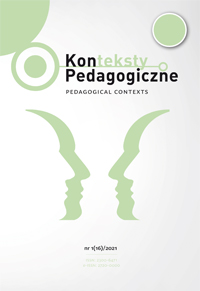Abstract
A number of changes caused by paradigmatic changes as well as additionally disturbed by COVID-19 have led to the emergence of solutions slightly different from the conventional ones in theory, methodology and practice of rehabilitation. The primary ecological states for the issues under consideration in which organisms may be found are those of population surplus and population shortage. The first of these states became the basis for the development of the evolution theory, while the second one served as an impulse to consider a number of phenomena in the convention of self-organizing systems, which undoubtedly influenced the formation of certain paradigms in the field of rehabilitation. Currently, the dominant humanistic paradigm with its detailed forms constitutes the basis for the development of research and experience related to the broadly understood issue of disability. With new ideas being constantly generated, the one which has been discussed in the article is the paradigm of the quality of life support for people with disabilities.
References
Bartniczak, M. (2017). Obszary zmian dyskursu naukowego warunkujące kierunek myślenia o narracji osób z niepełnosprawnością intelektualną. Niepełnosprawność. Dyskursy Pedagogiki Specjalnej, 25, 38–54.
von Bertalanffy, L. (1984). Ogólna teoria systemów. Podstawy, rozwój, zastosowania, tłum. E. Woydyłło-Woźniak. Warszawa: PWN.
Byra, S. (2019). Niepełnosprawność ruchowa w paradygmacie pozytywnie ukierunkowanym. Lublin: Wydawnictwo UMCS.
Dykcik, W. (2009). Pedagogika specjalna w systemie nauk pedagogicznych. W: W. Dykcik (red.), Pedagogika specjalna (s. 29–31) Poznań: Wydawnictwo UAM.
Ecarius, J. (2017). Pedagogiczne badania biograficzne w Niemczech. Nauki o Wychowaniu. Studia Interdyscyplinarne, 1(4), 35–46.
Głodkowska, J. (2014). Rozważania nad podmiotowością a niepełnosprawność – u źródeł współczesnego ujęcia i w perspektywie interdyscyplinarnej. Człowiek – Niepełnosprawność –Społeczeństwo, 2(24), 92–109.
Głodkowska, J. (2015). Autorstwo własnego życia osoby z niepełnosprawnością – konceptualizacja w perspektywie dobrostanu, podmiotowości, optymalnego funkcjonowania i wsparcia. W: J. Głodkowska (red.), Personalistyczne ujęcie fenomenu niepełnosprawności (s. 110–134). Warszawa: Wydawnictwo Akademii Pedagogiki Specjalnej.
Gómez, L.E., Schalock, R.L. i Verdugo, M.A. (2021). A New Paradigm in the Field of Intellectual and Developmental Disabilities: Characteristics and Evaluation. Psicothema, 33(1), 28–35. DOI: 10.7334/psicothema2020.385.
Hejnicka-Bezwińska, T. (2007). Paradygmat humanistyczny w pedagogice a pedagogika humanistyczna. W: J. Rutkowiak, D. Kubinowski i M. Nowak (red.), Edukacja, moralność, sfera publiczna. Materiały z VI Ogólnopolskiego Zjazdu Pedagogicznego PTP (s. 462–466). Lublin: Oficyna Wydawnicza „Verba”.
Kijak, R. (2016). Dorośli z głębszą niepełnosprawnością intelektualną jako partnerzy, mał¬żonkowie i rodzice. Kraków: Wydawnictwo Naukowe Uniwersytetu Pedagogicznego.
Kowalik, S. (2007). Bariery utrudniające włączanie osób niepełnosprawnych w życie społeczne. Próba sformułowania nowego podejścia teoretycznego. Nauka, 3, 49–69.
Kowalik, S. (2018). Stosowana psychologia rehabilitacji. Warszawa: Wydawnictwo Naukowe Scholar.
Krause, A. (2010). Współczesne paradygmaty pedagogiki specjalnej. Kraków: Oficyna Wydawnicza „Impuls”.
Kuhn, T.S. (1968). Struktura rewolucji naukowych, tłum. H. Ostromęcka. Warszawa: PIW.
Livneh, H. i Martz, E. (2016). Psychosocial Adaptation to Disability Within the Context of Positive Psychology: Philosophical Aspects and Historical Roots. Journal of Occupational Rehabilitation, 26, 13–19. DOI: 10.1007/s10926-015-9601-6.
Majewicz, P. (1999). Orientacja patogenetyczna i salutogenetyczna w psychologii zdrowia – implikacje dla wychowania. W: H. Kosętka i J. Wyczesany (red.), Edukacja zdrowotna dzieci i młodzieży (s. 61–71). Kraków: Wydawnictwo Naukowe Akademii Pedagogicznej.
Majewicz, P. (2006). Niepełnosprawność z perspektywy psychologii pozytywnej. W: J. Baran i S. Olszewski (red.), Świat pełen znaczeń – kultura i niepełnosprawność (s. 473–488). Kraków: Oficyna Wydawnicza „Impuls”.
Majewicz, P. (2015). Pozytywna psychologia rehabilitacji jako teoretyczno-praktyczna realizacja paradygmatu pozytywnego ukierunkowania. W: J. Głodkowska (red.), Personalistyczne ujęcie fenomenu niepełnosprawności (s. 25–42). Warszawa: Wydawnictwo Akademii Pedagogiki Specjalnej.
Majewicz, P. (2019). Rehabilitacja osób z niepełnosprawnością z perspektywy psychologii pozytywnej. Człowiek – Niepełnosprawność – Społeczeństwo, 44(2), 29–49.
Mikrut, A. (2011). Pozytywne ukierunkowanie jako paradygmat pedagogiki specjalnej. W: J. Baran, T. Cierpiałowska i A. Mikrut (red.), Teoria i praktyka oddziaływań profilaktyczno-wspierających rozwój osób z niepełnosprawnością (s. 16–22). Kraków: Wydawnictwo Naukowe Uniwersytetu Pedagogicznego.
Niżnik, J. (1979). Idea paradygmatu w naukach społecznych. Człowiek i Światopogląd, 1, 143–150.
Obuchowska, I. (1987). Obecne i nieobecne paradygmaty w pedagogice specjalnej. Kwartalnik Pedagogiczny, 4, 29–33.
Rolling, J.H., Jr. (2020). Paradigms Lost. Studies in Art Education. A Journal of Issues and Research, 61(4), 356–360. DOI: https://doi.org/10.1080/00393541.2020.1820840.
Rudnicki, S. (2014). Niepełnosprawność i złożoność. Studia Socjologiczne, 2(213), 43–61.
Spassiani, N.A., Sawyer, A.R., Abou Chacra, M.S., Koch, K., Muñoz, Y.A. i Lunsky, Y. (2016). “Teaches People That I’m More Than a Disability”: Using Nominal Group Technique in Patient-Oriented Research for People With Intellectual and Developmental Disabilities. Intellectual and Developmental Disabilities, 54(2), 112–122. DOI: 10.1352/1934-9556-54.2.112.
Walmsley, J. (2001). Normalisation, Emancipatory Research and Inclusive Research in Learning Disability. Disability and Society, 16(2), 187–205.
Wehmeyer, M.L. (2013). Beyond Pathology: Positive Psychology and Disability. W: M.L. Wehmeyer (red.), The Oxford Handbook of Positive Psychology and Disability (s. 3–6). New York: Oxford University Press.
Woynarowska, A. (2010). Niepełnosprawność intelektualna w publicznym i prywatnym dyskursie. Kraków: Oficyna Wydawnicza „Impuls”.
Zaorska, M. (2015). Paradygmatyczny pultanizm współczesnej pedagogiki specjalnej. Przegląd Badań Edukacyjnych, 20(1), 171–182.
In accordance with the recommendation of the Ministry of Science and Higher Education, which aims to counteract the practice of “ghostwriting” and “guest authorship,” all authors submitting their text for publication should attach an author’s statement which declares the contribution of each of the authors to the article. The printed and signed statement should be delivered by mail or other means to editor-in-chief Joanna Skibska or sent in the form of a scan to the following e-mail address: redakcja@kontekstypedagogczne.pl. The authors will not receive remuneration for publishing their papers. The editors reserve the right to make minor editorial changes to the articles which will not affect the substance of the article. We encourage all authors to prepare their articles in accordance with the guidelines for manuscript preparation. Download pdf file.
Authors transfer all copyrights and grant the journal the right of first publication with the work simultaneously licensed under a Creative Commons Attribution License that allows others to share the work with acknowledgement of the work's authorship and initial publication in this journal. All authors agree to the publishing of their email addresses, affiliations and short bio statements with their articles during the submission process.

